Focus on Research
"Focus on Research" is an exciting initiative designed to spotlight the groundbreaking research happening within the Faculty of Science and Engineering. Through this platform, we share compelling stories that showcase the innovative projects, discoveries, and advancements led by our researchers. Stay tuned for regular updates that highlight the breadth and impact of the excellent research taking place across our Faculty.
If you would like to showcase your research, study, or project, please complete the form below.
Link to Focus on Research MS Form: https://forms.office.com/e/3Adnsdvn7K
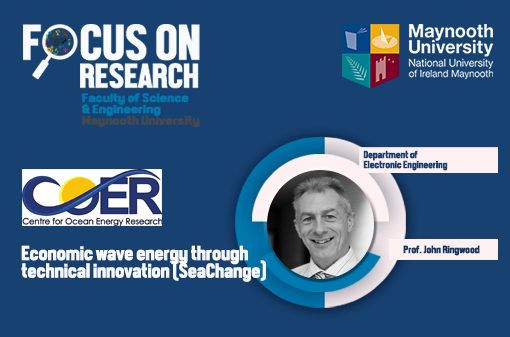
Economic wave energy through technical innovation (SeaChange) – Prof John Ringwood
Despite the vast global wave energy potential, and the need to diversify the range of renewable energy sources to provide dispatchable carbon-free energy, the current cost of wave energy makes it relatively uneconomic in relation to other renewable, and non-renewable, energy forms. This Research Ireland funded project proposes a combination of strategic technological improvements, with both broad applicability as well as specific device improvements, to effect a significant impact on the economic performance of wave energy systems and produce the step change needed to accelerate the technical and commercial development of wave power. Collaborators have been drawn from the University of Illinois (USA), CorPower Ocean AB (Sweden), National Renewable Energy Lab. (NREL, USA) and TU Denmark.
This project is based in the Centre for Ocean Energy Research (COER), in the Dept. of Electronic Engineering.
Recent publications from the project include:
- Said, H.A., Sarda, A.C. and Ringwood, J.V. Fault management in wave energy systems: Diagnosis, prognosis, and fault-tolerant control, Ocean Engineering
- Ziaei, A., Said, H.A. and Ringwood, J.V. Health sensitive control of wave energy converters: Possibilities and challenges, Proc. RENEW 2024
- Ringwood, J.V. Control co-design for wave energy systems, Applied Ocean Research
- Health-sensitive control of wave energy converters: A primer Amin Ziaei, Hafiz Ahsan Said, John V. Ringwood
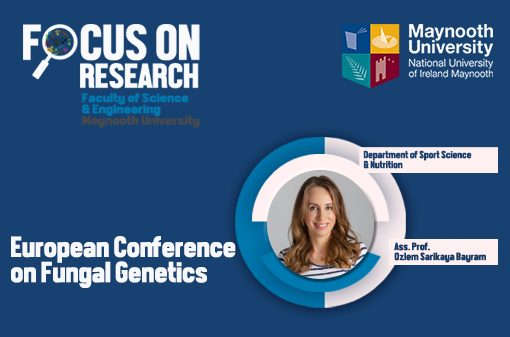
European Conference on Fungal Genetics – Assistant Professor Özlem Sarikaya Bayram
Biology and Food Science Researchers Lead the Prestigious 17th European Conference on Fungal Genetics, Uniting Global Experts The 17th European Conference on Fungal Genetics (ECFG) brought together 852 delegates from 50 countries, marking a significant milestone in advancing research and fostering international collaboration in fungal genetics. The event was held at the Convention Centre Dublin from March 2-5, 2025. Researchers from the Departments of Biology and Sport Science & Nutrition played a leading role in organizing and chairing the conference. Prof. Kevin Kavanagh and Prof. Özgür Bayram (Biology Department) co-chaired the conference, with Prof. Kavanagh delivering the opening speech and chairing the first-day session, while Prof. Bayram led the closing ceremony and presented 15 poster and talk awards to early-career researchers.
Several faculty members played pivotal roles in shaping discussions across various research areas:
- Prof. Özgür Bayram (Biology Department) – Co-chair of the ECFG Conference.
- Prof. Kevin Kavanagh (Biology Department) – Co-chair of the ECFG Conference.
- Prof. Seán Doyle (Biology Department) chaired the Biotechnology concurrent session.
- Dr. Özlem Sarikaya Bayram (Sport Science and Nutrition Department) co-chaired the Asperfest satellite meeting.
- Prof. Emmanuelle Graciet (Biology Department) co-chaired the Plant Pathology session.
- Dr. Rebecca Owens (Biology Department) co-chaired the Fungal Secondary Metabolism session.
- PhD students and researchers, including Aaron Curtis (Medical Mycology Lab), Dr. Thuc Bui and Saba Shaber (Fungal Genetics Laboratory), and Pranay Agarwal (Future Foods Laboratory), actively assisted delegates throughout the event.
The local organizing committee, comprising seven additional academics from Trinity College Dublin (TCD), University College Dublin (UCD), Queen’s University Belfast (QUB), University College Cork (UCC), and University of Galway (NUIG), also played a crucial role in the conference’s success.
Spanning four days, the event featured 21 keynote speakers, delivering cutting-edge insights into the field. Researchers presented 533 posters and delivered 377 oral presentations, showcasing the latest breakthroughs and innovations. With 711 abstracts submitted, the conference demonstrated the vibrancy of the fungal genetics research community. Additionally, the participation of 20 sponsors and exhibitors highlighted the growing industry interest, facilitating discussions on emerging technologies and applications. This landmark event reinforced the importance of interdisciplinary collaboration in fungal genetics and its expanding impact on science and innovation.
Further information can be found here.
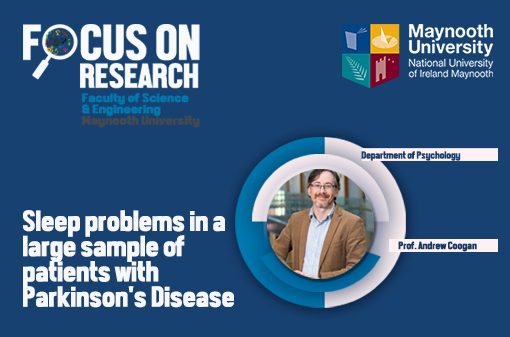
Sleep problems in a large sample of patients with Parkinson's Disease – Prof. Andrew Coogan
MU research reveals that sleep problems are very common in Parkinson’s disease. Researchers at Maynooth University’s Kathleen Lonsdale Institute for Human Health Research and Department of Psychology have recently published a study showing that sleep problems are very common in people with Parkinson’s disease, and such sleep problems are associated with poorer quality of life in patients. Parkinson’s disease is the second most common neurodegenerative brain disease and is estimated to affect over six million people worldwide. The MU study was conducted by PhD candidate Ziba Asadpoordezaki, Research Fellow Dr. Beverley Henley and Professor Andrew Coogan, and was published in the Journal of Sleep Research.
The study examined records from over 38,000 patients with Parkinson’s disease in a database from the Michael J. Fox Foundation in which patients with Parkinson’s disease described their experiences of Parkinson’s disease, their mental health and cognition, and their sleep. Results of the study show that 84% of patients with Parkinson’s disease report experiencing sleep problems, a rate that is considerably higher than in people of the same age without the disease.
The presence of sleep problems, such as difficulty falling or staying asleep, was associated with more symptoms of depression, greater difficulties with independent living and poorer quality of life. The presence of sleep problems was also associated with greater problems relating to “OFF periods”, times when the effects of medication for Parkinson’s disease wear off.
Professor Coogan says “Sleep problems are a significant burden to quality of life in a number of chronic health conditions. Our study shows how important sleep is to address in Parkinson’s disease, one of the most common and debilitating brain diseases” Professor Coogan also noted the key enablers of their research: The research database from the Michael J. Fox Foundation that we drew on in our study is a great example of the wonderful opportunities presented by large international studies for research that will help advance key questions in human health and benefit patients. In order to best take advantage of such opportunities, we also need collaborations between colleagues, such as facilitated in our study by the Kathleen Lonsdale Institute for Human Health Research at MU, which brings together colleagues with different expertise in health-related research”.
Link to the research paper here.

GoGreen Next Horizon Europe Project - Dr. Tadhg MacIntyre
GoGreen Next, a €6 million EU Horizon Europe project focused on urban health across four distinct biogeographical urban areas in Europe was featured as part of the sustainability research funded in Ireland by the EU. Ireland is particularly successful in this topic area and Maynooth is part of three current project including BioBeo, and GoGreen Routes. This research clearly resonates with the beacons of sustainability and climate change and health and wellbeing in our 2023-2028 Strategy.
A recent Horizon Europe conference celebrates MU GoGreenNext initiatives, read more here.
Click the link here to find out more about the Horizon Europe Project.
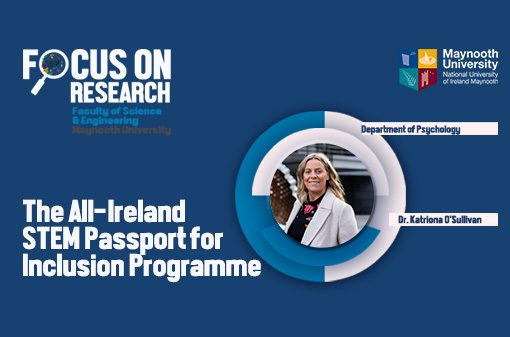
The All-Ireland STEM Passport for Inclusion Programme - Dr Katriona O'Sullivan
The All-Ireland STEM Passport for Inclusion Programme is a joint initiative by Maynooth University, Microsoft Ireland, Science Foundation Ireland and the Department of Education that addresses inequalities with access to STEM careers among secondary school students in socially disadvantaged communities. The programme’s innovative approach, which combines an educational qualification (Level 6 NFQ), education supports, and mentoring from industry role models, provides a unique pathway for approximately 5,000 students to progress to 3rd level education and achieve a STEM qualification.
The national roll-out of the programme (2023-2025), which is funded by Microsoft, Science Foundation Ireland, and the Department of Education, will see participants graduate from partner universities, Atlantic Technological University, Munster Technological University and Maynooth University.
Click here and watch a video to learn more.
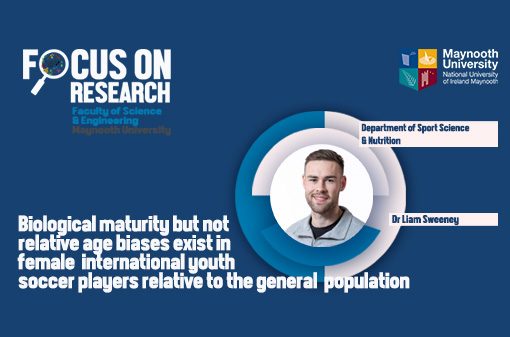
Biological maturity but not relative age biases exist in female international youth soccer players relative to the general population - Dr Liam Sweeney
Dr Liam Sweeney from the Department of Sport Science and Nutrition led a research project in collaboration with the Football Association of Ireland, which was Sport Ireland Research Grant funded.
This project aimed to examine the biological maturity statuses of female international soccer players competing for Ireland’s youth international teams. The researchers sought to compare each player’s biological age to their chronological age, to ultimately identify whether players are typically advanced, delayed, or in-line biologically relative to their chronological age. Findings show that female players selected for these international teams are generally advanced in biological maturity for their chronological age, although to a small degree. From a physical perspective, earlier maturing girls are typically taller, heavier, and have greater absolute muscular strength, particularly in the lower body. These physical adaptations conferred by advanced biological maturity may provide one primary explanation as to why earlier maturing girls are preferentially selected in such contexts. The findings highlight the importance of monitoring biological maturity in youth athletes throughout development and show that the biological maturity of a given youth athlete can significantly influence their physical performance, and ultimately the opportunities that may be provided during their developmental pathway.
Led by Dr. Liam Sweeney, this study was recently published in Biology of Sport, one of the highest-ranking sports science journals, with department college Dr. Jack Hickey and co-authors Cian Sweeney from Nottingham Trent University in England, Dr. Tommy Lundberg from Karolinska Institute in Sweden, and Dr. Áine MacNamara from Dublin City University.
Loneliness Taskforce Research Network: A Step Towards Togetherness - Dr. Joanna McHugh Power
The Loneliness Taskforce Research Network, launched in 2023, is an initiative aimed at addressing Ireland's notably high rates of loneliness, a significant issue with wide-ranging health impacts. Led by Dr. Joanna McHugh Power from Maynooth University’s Department of Psychology, the network seeks to foster high-quality research to guide policy and practical interventions. Supported by the organisation ALONE, the network connects researchers, policymakers, and practitioners to identify key priorities, including understanding youth loneliness, evaluating existing interventions, and exploring the unique drivers of loneliness in Ireland. The inaugural event in 2024 set the stage for collaborative efforts to tackle this pressing societal challenge.
More information on the research network is on the website: www.lonelinessresearch.org.

